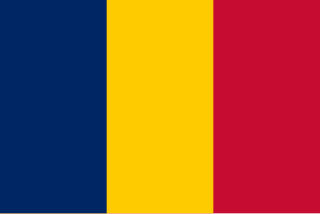
The Chadic languages form a branch of the Afroasiatic language family. They are spoken in parts of the Sahel. They include 150 languages spoken across northern Nigeria, southern Niger, southern Chad, the Central African Republic, and northern Cameroon. The most widely spoken Chadic language is Hausa, a lingua franca of much of inland Eastern West Africa.

Hausa is a Chadic language spoken by the Hausa people, mainly within the territories of Niger and the northern half of Nigeria, and with significant minorities in Chad, Ghana, and Cameroon.

The Biu–Mandara or Central Chadic languages of the Afro-Asiatic family are spoken in Nigeria, Chad and Cameroon. The most widely spoken is Kamwe, with 300,000 speakers.
Pali is a Middle Indo-Aryan language.

Chad has two official languages, French and Modern Standard Arabic, and over 120 indigenous languages. A vernacular version of Arabic, Chadian Arabic, is a lingua franca and the language of commerce, spoken by 40-60% of the population. The two official languages have fewer speakers than Chadian Arabic. Standard Arabic is spoken by around 615,000 speakers. French is widely spoken in the main cities such as N'Djamena and by most men in the south of the country. Most schooling is in French.
Tera or TERA may refer to:

There are over 525 native languages spoken in Nigeria. The official language of Nigeria is English, the language of former colonial British Nigeria. As reported in 2003, Nigerian English and Nigerian Pidgin were spoken as a second language by 60 million people in Nigeria. Communication in the English language is much more popular in the country's urban communities than it is in the rural areas, due to globalization.
Bade is a West Chadic language spoken by the Bade people in Yobe State and Jigawa State, Nigeria. Their traditional ruler is the Emir of Bade. Similar to many other Western African languages, Bade is a vulnerable language at great risk of extinction. With 250,000 speakers, the language and the culture of the Bade people have suffered over the last several years. As the language continues to fade, the culture and historic value associated with the language perishes as well. The local dialect is shifting from Bade to Hausa. Across West Africa, the impact on local communities through the loss of the indigenous tongues will be significant. The endangerment of the Bade language represents the worldwide language diversity that is at risk. Many African languages have only received little linguistic attention, impacting these African languages.
Yedina, also known as Buduma (Boudouma), is a Chadic language of the Biu–Mandara branch spoken around Lake Chad in western Chad and neighbouring Cameroon and Nigeria.

The Bole–Tangale languages are a branch of West Chadic languages that are spoken in various states of northeastern Nigeria.
The Kirat Kulung are one of the indigenous communities of Nepal, as well as parts of northeastern Sikkim and Darjeeling district of India, having their own Kulung language, culture, history and tradition. The Kulung population in Nepal is estimated to be in the region of 150,000-200,000.
Saya is a Chadic dialect cluster of Nigeria.
Kulung is one of the Southern Bantoid Jarawan languages of Nigeria.
Kulung (Wurkum) is a minor West Chadic language of Karim Lamido LGA, Taraba State, Nigeria that was recently discovered by Roger Blench. The language is not reported in Ethnologue or Glottolog. Blench (2019) gives a rough estimate of about 2,000 speakers.
This page is based on this
Wikipedia article Text is available under the
CC BY-SA 4.0 license; additional terms may apply.
Images, videos and audio are available under their respective licenses.




